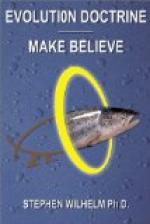On the contrary, as we trace the development of social organization from its earliest rudiments it becomes ever clearer that evolution has been continuous, and that during later ages there has been no suspension of the natural laws which earlier produced the human type of organism. The lessons we have learned are by no means to be ignored from this point forward; all of our conceptions of human biological history must be kept in mind, for anything new that we may learn is superadded to the rest,—it cannot disturb or alter the foundations already laid. It is even more important to realize that the same scientific method is to be employed which has been so fruitful heretofore. It has given us interesting facts; it has indicated the most profitable lines of attack upon one and another scientific problem; and it has demonstrated the practical value of accurate knowledge, even of information about the evolutionary process. As familiarity with the laws of human physiology enables one to lead a more hygienic and efficient life, and as the results of analyzing the evolution of mentality make it possible to advance intellectually with greater sureness, conserving our mental energies for effort along lines established by hereditary endowment, so now we are justified in expecting that a clear insight into the origin of our social situation and social obligations will have a higher usefulness beyond the value of the mere interest inhering in our new knowledge. Every one is necessarily concerned with social questions; never before has there been so much world-wide discussion of topics in this field. And while it is true that much good may be accomplished in utter ignorance of the past history of human institutions and of the underlying principles which control the varied types of organic associations, surely enlightened efforts will be more effective for good. Therefore every member of a community who is capable of thinking straight rests under an obligation imposed by nature to learn how he is related to his fellow-men; he must act in concert with them or else he forfeits his rights as a social unit. And it is his clear duty to search among the results of science for aid in ascertaining what he ought to do, and what reasons are given by evolution for the nature of his vital duties.




